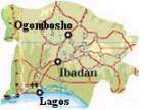THE YORUBAS
Location: Southwestern Nigeria,
The Yoruba claim that they have 401 deities; in truth, there are more than these. The complexity of their cosmology has led Western scholars to compare them to the Ancient Greeks and their impressive pantheon. Yoruba deities are known as orisha, and the high god is Olorun. No organized priesthoods or shrines exist in honor of Olorun, but his spirit is invoked to ask for blessings and to confer thanks. The Yoruba believe that when they die they enter the realm of the ancestors where they still have influence on earth. Annual homage is paid to the grave sites of ones' forbears, and lineage heads are responsible for honoring all deceased members of the lineage through a yearly sacrifice. Maskers (egungun) appear at funerals and are believed to embody the spirit of the deceased person. Other important orishas include Eshu, the trickster; Shango, the god of thunder; and Ogun, the god of iron and modern technology.
|
 |
|
THE HISTORY OF THE YORUBA PEOPLE
The oral history of the Yoruba describes an origin myth, which tells of God lowering a chain at Ile-Ife, down which came Oduduwa, the ancestor of all people, bringing with him a cock, some earth, and a palm kernel. The earth was thrown into the water, the cocked scratched it to become land, and the kernel grew into a tree with sixteen limbs, representing the original sixteen kingdoms. The empire of Oyo arose at the end of the 15th century aided by Portuguese guns. Expansion of the kingdom is associated with the acquisition of the horse. At the end of the 18th century civil war broke out at Oyo, the rebels called for assistance to the Fulani, but the latter ended up conquering all of Oyo by the 1830s. The Fulani invasion pushed many Yoruba to the south where the towns of Ibadan and Abeokuta were founded. In the late 1880s, with the help of a British mediator, a treaty was signed between the various warring factions. Yorubaland was officially colonized by the British in 1901, but a system of indirect rule was established that mimicked the structure of Yoruba governance.
THEIR ARTS
The arts of the Yoruba are as numerous as their deities, and many objects are placed on shrines to honor the gods and the ancestors. Beautiful sculpture abounds in wood and brass and the occasional terracotta. Varied masking traditions have resulted in a great diversity of mask forms. Additional important arts include pottery, weaving, beadworking and metalsmithing.
Email Me!
Links to Other Sites
My Links |


